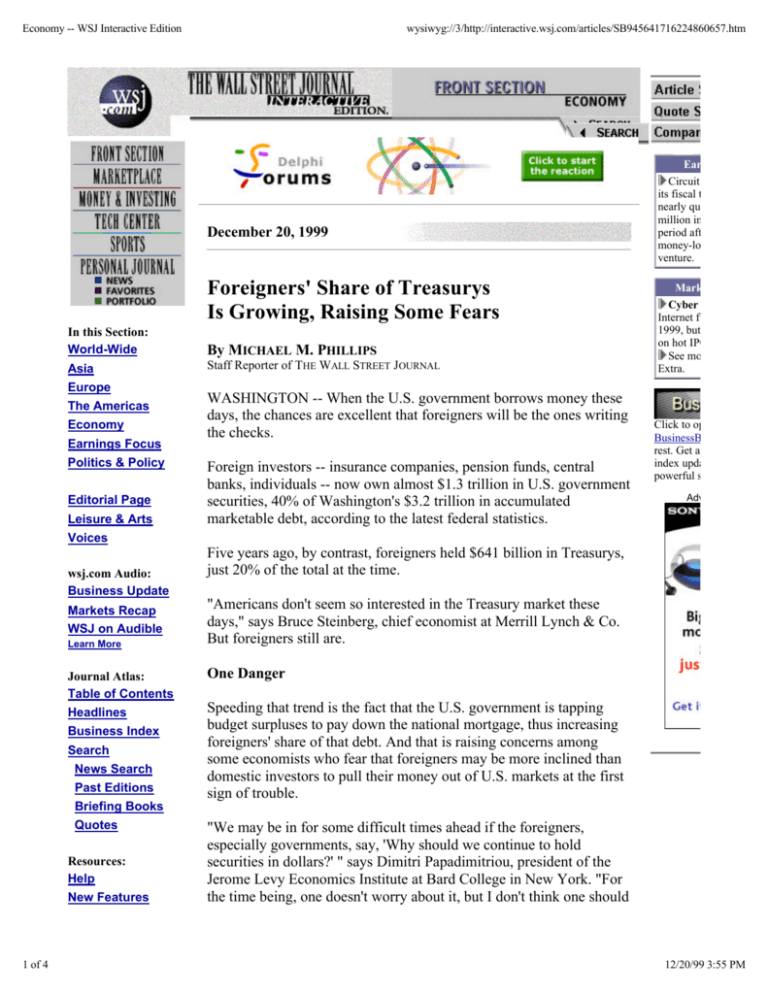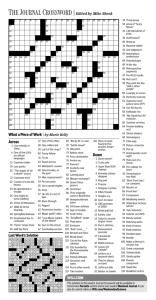
Economy -- WSJ Interactive Edition
wysiwyg://3/http://interactive.wsj.com/articles/SB945641716224860657.htm
December 20, 1999
Foreigners' Share of Treasurys
Is Growing, Raising Some Fears
In this Section:
World-Wide
By MICHAEL M. PHILLIPS
Asia
Staff Reporter of THE WALL STREET JOURNAL
Europe
The Americas
Economy
Earnings Focus
Politics & Policy
Editorial Page
Leisure & Arts
WASHINGTON -- When the U.S. government borrows money these
days, the chances are excellent that foreigners will be the ones writing
the checks.
Foreign investors -- insurance companies, pension funds, central
banks, individuals -- now own almost $1.3 trillion in U.S. government
securities, 40% of Washington's $3.2 trillion in accumulated
marketable debt, according to the latest federal statistics.
Earnings Focus
Circuit City Stores sai
its fiscal third-quarter pr
nearly quadrupled to $51
million in its first full
period after closing a
money-losing videodisk
venture.
Marketplace Extra
Cyber Investing:
Internet funds rocked in
1999, but many depende
on hot IPOs.
See more of Marketpla
Extra.
Click to open our new
BusinessBox
rest. Get automatic news
index updates plus a
powerful search feature.
Advertisements
Voices
wsj.com Audio:
Business Update
Markets Recap
WSJ on Audible
Learn More
Five years ago, by contrast, foreigners held $641 billion in Treasurys,
just 20% of the total at the time.
"Americans don't seem so interested in the Treasury market these
days," says Bruce Steinberg, chief economist at Merrill Lynch & Co.
But foreigners still are.
Journal Atlas:
Table of Contents
One Danger
Headlines
Speeding that trend is the fact that the U.S. government is tapping
budget surpluses to pay down the national mortgage, thus increasing
foreigners' share of that debt. And that is raising concerns among
some economists who fear that foreigners may be more inclined than
domestic investors to pull their money out of U.S. markets at the first
sign of trouble.
Business Index
Search
News Search
Past Editions
Briefing Books
Quotes
Resources:
Help
New Features
1 of 4
"We may be in for some difficult times ahead if the foreigners,
especially governments, say, 'Why should we continue to hold
securities in dollars?' " says Dimitri Papadimitriou, president of the
Jerome Levy Economics Institute at Bard College in New York. "For
the time being, one doesn't worry about it, but I don't think one should
12/20/99 3:55 PM
Economy -- WSJ Interactive Edition
wysiwyg://3/http://interactive.wsj.com/articles/SB945641716224860657.htm
be complacent about it." The result of a foreign pullout could be a
sharp drop in the dollar and higher interest rates.
E-mail Center
Your Account
Contact Us
Glossary
Special Reports
Weather
Share with your friends.
Powered by Amazon.com
STOCK QUOTES
Select exchange:
U.S.
Enter symbols:
Go
Symbol lookup
Other wsj.com Sites:
Careers
Homes
Personal Tech
Starting a Business
Travel
The Print Journal:
Subscribe
Still, in today's global market, it's far from clear that foreign investors
are any more inclined to take their money out of the U.S. than
American investors are. Indeed, Mr. Steinberg and many other
analysts argue that foreign institutional investors behave more or less
just like American pension funds and insurance companies.
The Japanese -- their own economy in the dumps for nearly a decade
-- have been particularly enthusiastic about U.S. Treasurys recently.
Europeans, once-avid Treasury buyers, have started taking bigger
risks recently, plunging much more of their money into the U.S. stock
market this year than last.
Borrowing Abroad to Buy Imports
Customer Service
More Dow Jones Sites:
dowjones.com
Barron's Online
DJ University
Publications Library
Reprints
SmartMoney
Dow Jones & Co.
Corrections
This foreign investment wave is the flip side of the huge U.S. trade
deficit, which hit a record $25.94 billion in October. The U.S., in
essence, is borrowing abroad to buy imports and to invest at home.
Foreigners finance that in many ways: They build factories in the
U.S., snap up American companies, make deposits in American
banks, roll the dice on U.S. stocks, purchase corporate bonds and buy
U.S. government securities.
In the last five years, a growing number of foreign investors have
chosen that last option. Treasurys are considered the safest place to
invest, since virtually nobody takes seriously the risk of a U.S.
default. That made them very attractive during the global financial
crisis that started in Thailand in mid-1997 and came to a close earlier
this year.
Central banks buy Treasurys as well, as they accumulate dollars. In
recent months, the Bank of Japan, for instance, has been buying
dollars in an effort to keep the yen from growing too strong. The
2 of 4
12/20/99 3:55 PM
Economy -- WSJ Interactive Edition
wysiwyg://3/http://interactive.wsj.com/articles/SB945641716224860657.htm
central bank doesn't want to leave that money in cash, and wouldn't
risk it on the stock market, so it ends up buying dollar-denominated
U.S. Treasurys.
"If you're in Japan and Japanese bonds pay 1.5% and Treasurys pay
6.5% -- or even if you're in Europe where [government bonds] pay
4% -- U.S. Treasurys look attractive, and corporate bonds look even
more attractive," says Mr. Steinberg.
Foreigners' Natural Conservatism
Treasurys also appeal to the natural conservatism of some foreigners,
especially Japanese insurance companies and other institutions. They
want to put money in the U.S., but aren't confident in their ability to
pick out individual companies on the stock or corporate-bond
markets, says Takanobu Igarashi, chief economist at Sanwa Bank's
New York office. "They're buying the U.S., not individual U.S.
companies," says Mr. Igarashi. "That's why U.S. Treasurys are more
popular among foreign investors than U.S. corporate bonds."
Of course, that appeal only lasts as long as the foreigners believe in
the continued strength of the dollar. Should the dollar drop 6% against
the yen, for instance, a 6% return from stocks or bonds would be
wiped out for Japanese investors who measure their success one yen
at a time.
While the dollar has lost ground against the yen in recent months, it
has posted gains against the euro. Treasury Secretary Lawrence
Summers has continued the strong-dollar rhetoric of his predecessor,
Robert Rubin, and foreign investors apparently haven't lost
confidence in the dollar yet. The Japanese plunked $37 billion down
for U.S. bonds this year, even as they pulled $31 billion out of the
stock market, according to Wrightson Associates, a New York
bond-market research firm.
European investors, however, have begun to seek out higher returns
than they can get from Treasurys. Europeans put 65% of their U.S.
portfolio investments into stocks this year, up from 40% in 1998 and
just 19% in 1997, Wrightson calculates.
Foreigners also purchased a record $69 billion in U.S. corporate and
other non-Treasury bonds in the third quarter of this year, compared
with $25.5 billion during the 1998 third quarter, according to the
Commerce Department's Bureau of Economic Analysis.
Mr. Steinberg believes many foreigners' investment portfolios are too
light on U.S. stocks, meaning they could well buy more shares in the
months and years ahead.
3 of 4
12/20/99 3:55 PM
Economy -- WSJ Interactive Edition
wysiwyg://3/http://interactive.wsj.com/articles/SB945641716224860657.htm
Still, only 8.2% of U.S. stocks are in foreign hands, as of the third
quarter of 1999, a mere fraction of foreigners' slice of the Treasury
market.
Princeton economist Alan Blinder, former vice chairman of the
Federal Reserve, says there is "an upside and a downside to
borrowing money" from abroad. "The upside is you get your hands on
the money. The downside is you have to pay it back."
Write to Michael M. Phillips at michael.phillips@wsj.com
Return to top of page | Format for printing
Copyright © 1999 Dow Jones & Company, Inc. All Rights Reserved.
4 of 4
12/20/99 3:55 PM






